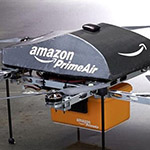Dec 9 2013
For Amazon’s recently announced drone delivery system to get off the ground, the company will have to solve numerous difficult technological challenges. Chief among them will be increasing battery life, getting the drones to work without a central command and to “think” on their own, and determining what kind of navigation sensors they will use.
 Drone
Drone
As complicated as those tasks may be, says a robotics expert at Washington University in St. Louis, they will be much more easily solved than the seemingly more simple issues of regulation and insurance.
“In all of the discussion I’ve read about the Amazon drone program, I’ve seen nothing about how these drones will be insured,” says Humberto Gonzalez, PhD, assistant professor of electrical engineering in the School of Engineering & Applied Science.
“Google currently has cars that can drive themselves. We have drones that can maneuver on their own in small numbers. From a robotics standpoint, the technology is there,” Gonzalez says. “But the reason these aren’t more widespread is that the insurance companies must be on board.”
Gonzalez’s research interests are in the broad area of dynamical systems, with an emphasis on computational tools for cyber-physical systems. He studies how components act in tight coordination and how robotic systems interact in open environments.
He says that central to Amazon’s issues, from a technological standpoint, will be getting mass numbers of drones to work completely autonomously for certain amounts of time.
“What if the environment changes? What if a person is standing where the drone needs to land? The military has been working on this technology, but with Amazon drones this becomes a real problem of scale,” Gonzalez says.
However, he’s confident Amazon can pull it off.
“Amazon has willing and smart people. They are going to do a fantastic job of engineering these drones, I have no doubt. But if we can’t figure out the issues of regulation and insurance, the drones will not be able to take off.”